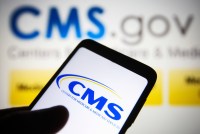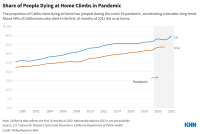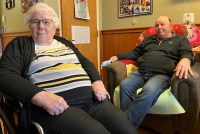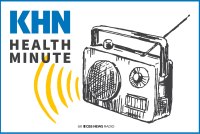Latest Morning Briefing Stories
Did Your Health Plan Rip Off Medicare?
KHN has released never-before-seen details of federal audits as the government weighs action against dozens of Medicare Advantage plans.
FDA Experts Are Still Puzzled Over Who Should Get Which Covid Shots and When
A single booster seems to prevent death and hospitalization in most people, but protection from the current vaccines wanes within months. FDA experts say they need to know more from the Centers for Disease Control and Prevention to decide the best long-term strategy.
What the Health? From KFF Health News: Part I: The State of the Abortion Debate 50 Years After ‘Roe’
In Part I of this special two-part episode, Alice Miranda Ollstein of Politico, Sandhya Raman of CQ Roll Call, and Sarah Varney of KHN join KHN chief Washington correspondent Julie Rovner to discuss how the abortion debate has evolved since the Supreme Court overturned the nationwide right to abortion in 2022, and what might be the flashpoints for 2023. Also in this episode, Rovner interviews Elizabeth Nash of the Guttmacher Institute, about changing reproductive policies in the states.
More Californians Are Dying at Home. Another Covid ‘New Normal’?
The proportion of Californians dying at home, rather than in a hospital or nursing home, accelerated during the pandemic, a trend that has outlasted the rigid lockdowns linked to the initial shift.
Florida Gov. DeSantis Falsely Claims Bivalent Booster Boosts Chances of Covid Infection
Experts say the Florida governor’s conclusion could not be drawn from the study he cited, adding that the research focused on health care workers, who are likelier to be exposed to covid and more likely to be vaccinated. Those findings should not be applied to the general public.
Wave of Rural Nursing Home Closures Grows Amid Staffing Crunch
Many small-town care facilities that remain open are limiting admissions, citing a lack of staff, while a wave of others shutter. That means more patients are marooned in hospitals or placed far away from their families.
Unmet Needs: Critics Cite Failures in Health Care for Vulnerable Foster Children
More states are moving to specialized managed-care contracts solely to handle medical and behavioral services for foster kids. But child advocates, foster parents, and even state officials say these and other care arrangements are shortchanging foster kids’ health needs.
As States Seek to Limit Abortions, Montana Wants to Redefine What Is Medically Necessary
Montana officials are looking to tighten rules around medically necessary abortions for those who use Medicaid as their health insurance. Reproductive health advocates and Democratic lawmakers have said the move is part of a broader agenda to whittle away access to the procedure.
Latino Teens Are Deputized as Health Educators to Sway the Unvaccinated
Some community health groups are training Latino teens to conduct outreach and education, particularly in places where covid vaccine fears linger.
Watch: Fifty Years after ‘Roe,’ Abortion Rights Battle Shifts to the States
On the 50th anniversary of Roe v. Wade, we asked people across the U.S. what the abrupt upending of abortion rights has meant to them, and we lay out the stakes in the battles ahead.
Transgender People in Rural America Struggle to Find Doctors Willing or Able to Provide Care
Many health professionals in rural areas don’t know how to provide gender-affirming care, leaving transgender patients with few options.
Abortion Debate Ramps Up in States as Congress Deadlocks
Abortion is a top issue for state lawmakers meeting for their first full sessions since Roe v. Wade was overturned.
Watch: Anti-Abortion Activists Rally in DC in a Watershed Moment for Their Movement
Friday’s annual March for Life rally in Washington, D.C., held for the first time since Roe v. Wade was overturned, signals a new chapter in the anti-abortion movement.
The ‘KHN Health Minute’ Debuts on CBS News Radio
Launched Jan. 12, the “Health Minute” brings original health care and health policy reporting from the KHN newsroom to the airwaves each week.
NFL Has Been Slow to Embrace Mental Health Support for Players
The shocking on-field cardiac arrest of Buffalo Bills safety Damar Hamlin traumatized some players and underscores the need for more consistent mental health support in a league whose athletes are trained to show no weakness.
Luring Out-of-State Professionals Is Just the First Step in Solving Montana’s Health Worker Shortage
Two proposals would make it easier for professionals with out-of-state licenses to work in Montana, but that tactic likely won’t be enough to fill the demand for mental health providers.
The debt ceiling crisis facing Washington puts Medicare and other popular entitlement programs squarely on the negotiating table this year as newly empowered Republicans demand spending cuts. Meanwhile, as more Americans than ever have health insurance, the nation’s health care workforce is straining under the load. Joanne Kenen of the Johns Hopkins Bloomberg School of Public Health and Politico, Tami Luhby of CNN, and Victoria Knight of Axios join KHN’s chief Washington correspondent Julie Rovner to discuss these topics and more. Plus, for extra credit, the panelists recommend their favorite health policy stories of the week they think you should read, too.
A $30 Million Gift to Build an Addiction Treatment Center. Then Staffers Had to Run It.
Howard Buffett, son of billionaire investor Warren Buffett and chairman of his own charitable foundation, gave $30 million to build an addiction treatment center in the central Illinois community where he farms. But the money was a one-time gift for infrastructure, so the clinic is on its own to keep it running.
Readers and Tweeters Diagnose Greed and Chronic Pain Within US Health Care System
KHN gives readers a chance to comment on a recent batch of stories.
After a Brief Pandemic Reprieve, Rural Workers Return to Life Without Paid Leave
Coastal and politically progressive states have passed stronger paid sick and family leave policies, but many workers in rural America are left out, facing tough decisions when choosing between caring for themselves or sick family members or keeping their jobs.

























